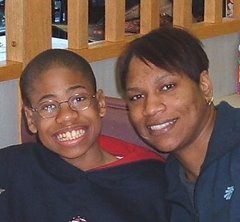Although this article is not directly related to autism, it offers another side to an all-too-real health care crisis, disparities between blacks and whites.
FOR IMMEDIATE RELEASE
June 27, 2005
CONTACT:
Earl Ofari Hutchinson
323-296-6331
hutchinsonreport@aol.com
WRONG DEBATE ON "RACE DRUG"
By Earl Ofari Hutchinson, BlackNews.com Columnist
Months before the FDA approved the controversial drug BiDil for sale to African-American heart patients, a furious debate raged. Black activists, academics, the New York Times, and some black medical practitioners denounced the FDA for approving the drug. They claimed that it reinforced dangerous and destructive racial stereotypes, made false race distinctions, the drug had not been thoroughly tested, and that it was a ploy by the drug's maker, NitroMed to make a quick buck. Black medical groups, the NAACP, and FDA officials hailed BiDil as a breakthrough in health care for blacks.
It's a misplaced debate. The real issue is the shameful gaping disparities in health care between blacks and whites, and the gross failure of the health care industry to provide adequate health care and treatment for blacks, especially poor blacks. Politicians, the government, insurers, and the health care industry have been virtually mute on that issue, and that didn't change in the debate over BiDil. That's a big reason that civil rights groups desperately snatched at BiDil as a wonder drug to cure black heart ailments.
The heath care crisis among blacks is severe and in some cases getting worse. The Center for Disease Control has repeatedly found that blacks have near double the rate of cancer, stroke, heart attacks, and diabetes than whites. The infant mortality rate gap between blacks and whites has actually worsened in the past three years. The racial disparities have had deadly consequences. In a study in the March/April issue of Health Affairs, former Surgeon General David Satcher estimated that 83,000 African-American deaths could be prevented each year if the disparities were eliminated. The chronic health disparity takes a terrible toll on the living as well. It decreases the quality of life, reduces worker productivity, drives up health care costs, and fuels suspicion among blacks that their lives are less important than that of whites.
The causes of the health disparities between blacks and whites are well known. They are poverty, the lack of access to affordable health care, the blatant discrimination by insurance companies against blacks, and the refusal of far too many doctors to aggressively provide the same quality health treatment to blacks as whites. Many in the medical profession are still loathe to finger racism and poverty as the prime causes of higher black disease and death rates, and worse, some blame blacks for their own poor health. Tossing the blame back on the victim absolves the government, insurers and the medical profession of any responsibility for the stubborn, and persistent disparities, and the need to do something about them. So far the solutions that government agencies and Congressional leaders have come with have been timid and ineffectual. The Department of Health and Human Services, for instance, established a work group to study the reasons for the disparities, and to monitor whatever progress is being made in eliminating the disparities. Republican Senate Majority leader Bill Frist has called for yet more study of the causes of the health disparities, and implored medical professionals to improve the quality of health care delivered. Congressional Democrats haven't done much better. Senator Ted Kennedy called for more study, and expanding Medicaid coverage. At a press conference, the week before the FDA approved BiDil, a legion of civil rights and medical groups praised the drug but made little mention of the gaping health disparities that make such a drug even necessary.
They also said nothing about the risk of drug manufacturers short cutting the rigorous, and time consuming testing, and costly process that the FDA normally requires before it approves a new drug for sale. That was the case with BiDil. NitroMed suspended tests when it appeared that the drug produced a heart cure for blacks. But two experts on the testing panel warned that race was not a substitute for genetic factors that could cause health problems, and that the drug should not be marketed exclusively for African-Americans. That admonition was lost in the rush to speed the drug to market.
If the company had followed the rules, and the FDA had stuck to its rules, NitroMed would have had to test the drug for the general public and that would have required much more testing. In that case, its patent would have expired in 2007. But by targeting the drug as a race specific drug, it extended the patent to 2020. Though the company immediately halted stock sales on word of the FDA approval of BiDil, its market value could jump, and sales will top $80 million when it markets the drug in September. Drug manufacturers will closely watch to see how the drug ultimately fares in the market, and if it works the wonders that the FDA expects, and civil rights groups hope, they almost certainly will clamor to get speedy FDA approval for other race drugs.
Time will tell whether BiDil significantly increases the life chances of black heart sufferers. In the meantime, the profit margin of NitroMed will climb. And so will the disparities in death and disease between blacks and whites.
Earl Ofari Hutchinson is a columnist for BlackNews.com, an author and political analyst.
For media interviews, contact:Mr. Hutchinson at 323-296-6331 or hutchinsonreport@aol.com
Forget what you haven't heard… Family site shares news, resources, announcements and free or low-cost ways to help us manage day-to-day living with autism.
Crystal Brown

About Me

- Crystal
- AutismConcepts.com and Child-Autism-Parent-Cafe.com share a large collection of useful autism information, resources, and how-to articles written by authors who are touched by autism, offering practical solutions to families. Particularly minority and underserved families and caregivers who may not know what to do or where to go for help.
MJ And Me

Blog Archive
-
▼
2005
(194)
-
▼
June
(22)
- Autism: 'There's this wonderful treatment -- but y...
- Bush Administration Supports Montgomery Schools in...
- FDA Probing ADHD Drugs for Side Effects
- Study confirms high, but stable, child autism rate
- Diagnosis HYPE
- The Got Mercury? Calculator
- Press Release - Wrong Debate on "Race Drug" (BiDil)
- Autism: A Unique Type of Mercury Poisoning
- Montel Williams, Fox18 News Talk About Autism/Vacc...
- NAACP supports Watson-Burton bill to abolish Mercu...
- Vaccine Ingredients - Thimerosal isn't the only po...
- Resources & Information on Mercury, Treatment & Po...
- Thimerosal & Autism - David Kirby's Book Evidence ...
- Dr. F. Edward Yazbak investigates connection betwe...
- Tobacco Science and the Thimerosal Scandal by RFK Jr.
- NYS Senate Passes Legislation to Ban Mercury in Va...
- Church calls on CDC, Doctors For Mercury-Free Vacc...
- Deadly Immunity by Robert J. Kennedy, Jr.
- Prompt Seizure Therapy May Have No Long-Term Benefit
- Autism + Vaccines = Tax Dollars
- NYS - Special Transportation for Students with Dis...
- Psychiatric Drug Information, Learn & Share with O...
-
▼
June
(22)